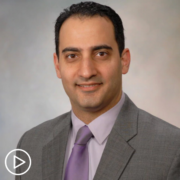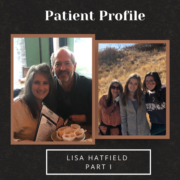Charise Gleason: Why Is It Important for You to Empower Patients?
Charise Gleason: Why Is It Important for You to Empower Patients? from Patient Empowerment Network on Vimeo.
How can patients and families be empowered? Advanced practice professional Charise Gleason from Winship Cancer Institute discusses her perspective and communication methods that have shown benefits for her myeloma patients.
See More from Empowering Providers to Empower Patients (EPEP)
Related Resources:

|

|

Dr. Craig Cole: Why Is It Important for You to Empower Patients? |
Transcript:
Charise Gleason:
I think it’s important to empower our patients, and we do that from day one. Patient comes to us, we’re starting to develop that relationship. And the discussions that we have early on can be very different from later, but we have to continually reinforce, ask questions, give patients the opportunity to ask us questions. I know when I talk to a patient about a clinical trial, and I’m documenting, I put that back in, patient or family member or care partner was given the opportunity to ask questions.
Our clinics go very quickly, and you have to make the time for your patients. So you have that relationship, and they know that they can bring issues to you. Sometimes we don’t get it right either, and you’ve got to own that and move on to that next step. So you continue that relationship. Patients are going through losing control with having a cancer, and like myeloma and many times patients never even heard of multiple myeloma until they come into our world.
So it is an ongoing open communication, and we don’t make decisions for them. We give them options and upfront or early relapse, you may have far more options than you do in that relapsed/refractory setting. But you’ve got to know what’s important to your patient and what their goals are. And, are they still working? Our patients vary in age. But you want to think about where your patient is, what’s important to them, and you don’t know that unless you ask the questions and have that communication. Our patients are very savvy. We go to meetings. The first thing they want to know is what did you learn? Even when they’re doing well on their current treatment, they want to know what’s next. What’s out there for me if this stops working?
When we’re in that biochemical relapse phase where we don’t have to change treatment, we’re already having those conversations about what are those options next for you? And so I think that having that team approach, that open communication is really important for our patients and empowers them to make good decisions. As an advanced practice provider, it’s important for me to explain my role, right?
Patients will come to a practice, and sometimes they’re surprised that I don’t see the physician every time I come. So I think it’s instead of ignoring that and not telling patients, I think it’s important that we describe our roles in that care as well. That, yes, I also specialize in multiple myeloma. I collaborate with your physician. We talk about you, even if you’re not seeing your physician. And so I think that patient and family understanding the rest of the team and what we bring to the table for them is essential as well.










